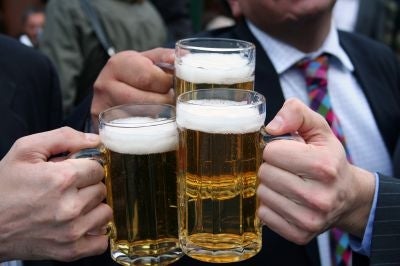Dutch researchers have found those carrying the long version of the dopamine D4 7-repeat genotype are more susceptible to excessive drinking triggered by sensitivity to "alcohol-related cues" including other people drinking and ads.
The study, led by Helle Larsen, a psychology graduate student at Radboud University Nijmegen in the Netherlands, was published in the July Online First edition of the journal Psychological Science.
One of the first recommendations via a six-step program in battling an addiction is to change your environment and that includes your drinking friends. This research highlights that for some the change is necessary as sensitivity to social drinking cues works both negatively (can influence binge drinking) and positively (makes an individual less apt to drink).
The participants - 113 self-admitted social drinkers - were monitored during a pub lab, and non-carriers drank half the amount of alcohol as carriers when others were also drinking up. Saliva tests were used to identify the 31 gene carriers.
Larsen and colleagues found individuals that the carry long version of the dopamine D4 (DRD4) 7-repeat genotype "may increase the risk for extensive alcohol use or abuse when spending time with heavy-drinking peers," according to a July 22 announcement by the Association for Psychological Science (APS).
The researchers concluded, "whether or not people are wired to adapt their drinking to the choice and pace of others may partly depend on their genetic susceptibility to drinking cues."
During the pub lab, both those with and without the DRD4 gene variant did not opt for a second round if it wasn't initiated or enjoyed by others. In this example the authors found that those with the DRD4 gene were sensitive to the social non-drinking cues.
These findings excited Kent Berridge, PhD, a bio-psychologist at the University of Michigan in the USA, according to the magazine Science News, "If this gene-environment interaction stands, and I don't see why it shouldn't, there is every reason to expect the effect would extend to drugs besides alcohol, as well to many motivated pursuits."
Full study, "A Variable-Number-of-Tandem-Repeats Polymorphism in the Dopamine D4 Receptor Gene Affects Social Adaptation of Alcohol Use: Investigation of a Gene-Environment Interaction": http://www.ncbi.nlm.nih.gov/pubmed/20610847

Join our commenting forum
Join thought-provoking conversations, follow other Independent readers and see their replies
Comments